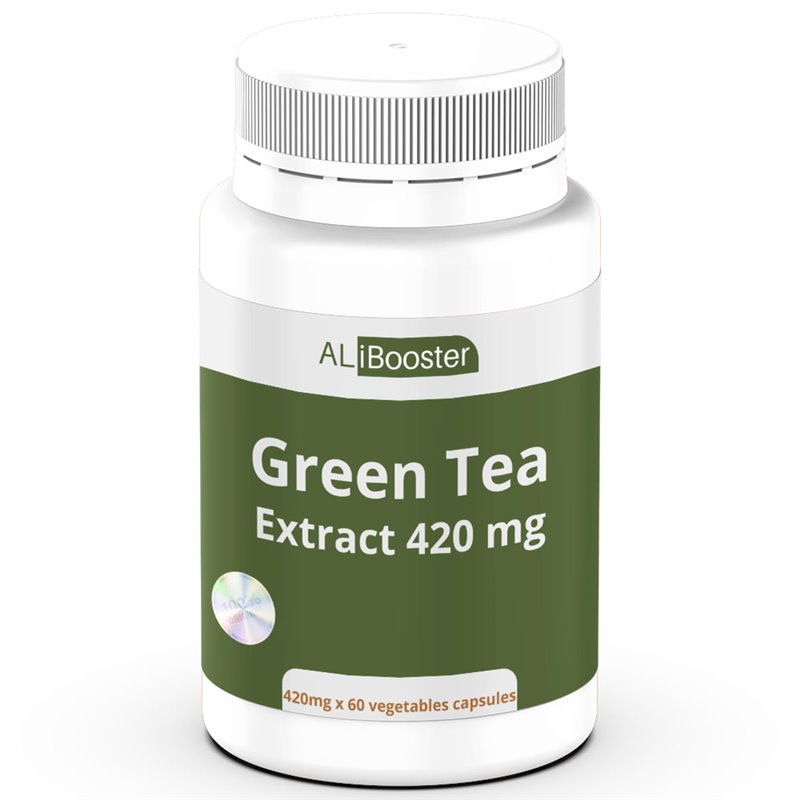



60 capsules, each with a dose of 420 mg'tea plant extract Folium Camellia Sinensis.
Rich in powerful antioxidants such as catechins and GGGG.
These capsules promote cardiovascular health and weight management.
Ideal for improving cognitive function and strengthening the immune system, these capsules offer a practical way to benefit from the benefits of green tea without having to consume several cups of tea every day.
This capsule food supplement takes advantage of the concentrated extracts of Camellia sinensis, the plant used for green tea, which is rich in beneficial antioxidants such as catechins and GCG. These capsules are perfect to support cardiovascular health, help with weight management and booster cognitive functions, offering a simple method to integrate the benefits of green tea into your daily routine without having to drink several cups a day.
The Camellia sinensis, more commonly called tea plant, is native to East Asia. Its specific geographic origins cover areas that today include northeastern India, north of Burma, south-west China and Tibet. Here are some details about its historical origins and its expansion:
China : The tea culture began in China thousands of years ago. According to legend, emperor Shen Nong discovered tea in 2737 before our era when leaves fell into water it was boiling. China is recognized for having developed many varieties and methods of tea preparation.
India : Although China is the cradle of tea, India also has an ancient history with tea, especially in the northeast regions, as in Assam, where tea grows in the wild. The tea industry in India was widely developed during the British colonial era in the 19th century.
Japan Buddhist monks introduced tea in Japan from China in the early 9th century. Japan has developed its own distinct tea culture, especially with the tea ceremony, a practice that incorporates spiritual and aesthetic elements.
The rest of the world : In the 19th century, the British began to cultivate tea in India to counter the Chinese monopoly on the tea market. Later, tea spread to other parts of the British Empire, including Sri Lanka (Ceylan) and Africa.
Tea remains one of the most consumed beverages in the world, with a rich cultural, economic and social history that reflects its Asian origin and its global expansion.
Green tea, from the plant Camellia sinensis, is famous for its many health benefits, supported by substantial scientific research. Some of the most notable benefits, accompanied by scientific evidence:
Richness in antioxidants :
Improvement of brain function :
Protection against certain types of cancer :
Weight management and improved metabolism :
Prevention and management of type 2 diabetes :
These studies provide a robust scientific overview of the potential benefits of green tea, supporting its use as a food supplement to improve overall health and prevent various diseases.
Each bottle contains 60 capsules of 420mg of Camellia Sinensis extract.
Our products certified by the Ministry of Health in Malaysia and have certification GMP.
Adults: Take 1 capsule once a day, after a meal.
Take with warm water.
Green tea supplements can be taken continuously on a daily basis, but it is advisable to pause or consult a health professional for long-term uses, especially if you consume high doses.
Following these guidelines, you can take advantage of benefits of green tea while minimizing the risk of side effects or drug interactions.
Data sheet
Specific References
Your review appreciation cannot be sent
Report comment
Report sent
Your report cannot be sent
Write your review
Review sent
Your review cannot be sent

60 capsules, each with a dose of 420 mg'tea plant extract Folium Camellia Sinensis.
Rich in powerful antioxidants such as catechins and GGGG.
These capsules promote cardiovascular health and weight management.
Ideal for improving cognitive function and strengthening the immune system, these capsules offer a practical way to benefit from the benefits of green tea without having to consume several cups of tea every day.